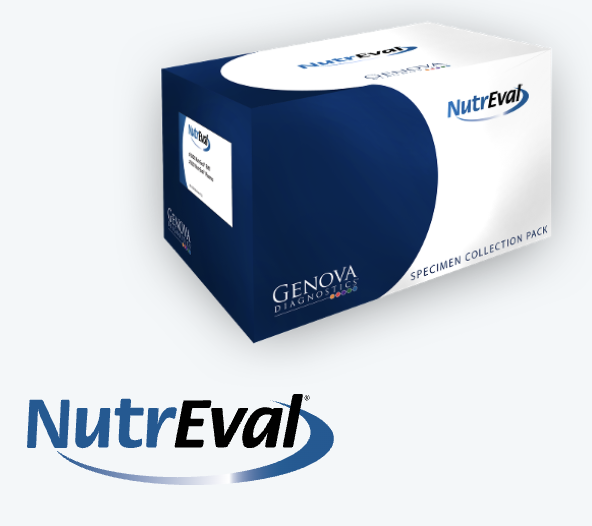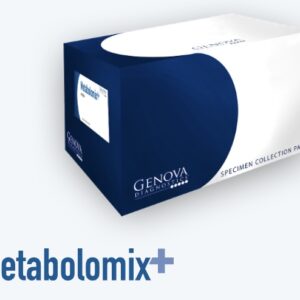Testing – Nutritional Deficiencies
$499.99
Description
The NutrEval® is both a blood and urine profile that evaluates over 125 biomarkers and assesses the body’s functional need for 40 antioxidants, vitamins, minerals, essential fatty acids, amino acids, digestive support, and other select nutrients. Personalized recommendations for nutrients are determined by using an algorithm based on your patient’s test findings. Functional pillars with a built-in scoring system guide the need for therapeutic support in areas of methylation, toxic exposure, mitochondrial dysfunction, fatty acid imbalances, and oxidative stress. The NutrEval Plasma and NutrEval FMV (first morning void) differ based on which sample type is used to measure amino acids, plasma or urine.
We also offer the Metabolomix+, a similar profile that can be collected entirely at home – no blood draw required.
Which patients might benefit from functional nutritional testing?
According to the World Health Organization, every country in the world is affected by one or more forms of malnutrition.[1] Nutritional imbalances are often root cause contributors to disease. Correcting these imbalances can result in optimized health and well-being of your patients.
Common clinical indications for testing include:
- Mood disorders
- Cardiovascular disease
- Obesity/ Insulin resistance/ Type 2 Diabetes
- Fatigue
- Weight Issues/ Dietary Guidance
- Malnutrition (often observed in the elderly)
- Maldigestion/Malabsorption
- Athletic performance
- Physical trauma/healing
*Testing is not performed in patients under 2 years old.
About the NutrEval Profile
The NutrEval report categorizes results into several metabolic areas (see sample reports in the Support Materials for individual analytes):
- Personalized Results Overview and Nutrient Need Overview
- Functional Imbalance Scores in areas of methylation, toxic exposure, mitochondrial dysfunction, fatty acid imbalances, and oxidative stress
- Nutrient Need Overview with recommendations for antioxidants, B-vitamins, minerals, essential fatty acids, GI support, and amino acids
- Interpretation-At-A-Glance pages provide nutritional educational support for you and your patient highlighting the function of each nutrient, cause of deficiency, complications of deficiency and food sources of the nutrient
- Organic Acids (urine)
- Malabsorption and Bacterial/ Yeast Dysbiosis Markers are metabolites produced by the gastrointestinal microbiome
- Cellular Energy & Mitochondrial Metabolites are biomarkers of carbohydrate and fatty acid metabolism, and the citric acid (Kreb’s) cycle
- Neurotransmitter Metabolites are downstream byproducts of epinephrine, norepinephrine, serotonin and dopamine
- Vitamin Markers are specific analytes used to assess functional levels of vitamin cofactors
- Toxin & Detoxification Markers relate to certain toxic metabolites and the body’s detoxification capacity
- Oxalate Markers relate to kidney stone formation, oxidative stress and metabolic dysfunction
- Oxidative Stress Markers include antioxidants glutathione (whole blood) and Coenzyme Q10 (serum), as well as the oxidative damage markers lipid peroxides and 8-OHdG (urine)
- Amino Acids (plasma or urine)
- Essential Amino Acids must be derived from dietary sources
- Nonessential Amino Acids are synthesized by the body
- Intermediary Metabolites are byproducts of amino acid metabolism
- B Vitamin Markers are involved in biochemical reactions that specifically require B vitamins
- Urea Cycle Markers are byproducts associated with nitrogen (ammonia) detoxification
- Glycine/Serine Metabolites are involved in the serine-to-choline pathway and the methylation pathways
- Dietary Peptide Related Markers can indicate incomplete protein breakdown and meat intake
- Essential and Metabolic Fatty Acids Markers (RBCs)
- Omega 3 Fatty Acids are essential for brain function and cardiovascular health and are anti-inflammatory
- Omega 6 Fatty Acids are involved in the balance of inflammation
- Omega 9 Fatty Acids are important for brain growth, nerve cell myelin, and reducing inflammation
- Saturated Fatty Acids are involved in liproprotein metabolism and adipose tissue inflammation
- Monounsaturated Fats include omega 7 fats and unhealthy trans fats
- Delta-6 Desaturase Activity assesses efficiency of this enzyme to metabolize omega 6’s and omega 3’s
- Cardiovascular Risk includes specific ratios and the Omega 3 Index
- Elemental Markers
- Nutrient Elements are direct measurements of copper and zinc (plasma), magnesium and potassium (RBC), and manganese and selenium (whole blood)
- Toxic Elements (whole blood) indicate exposure to lead, mercury, arsenic or cadmium within approximately a 90-120 day timeframe
- Add-on Vitamin D (serum) measures a total of 25-hydroxyvitamin D3 (cholecalciferol) and 25-hydroxyvitamin D2 (ergocalciferol)
- Add-on SNPs (buccal swab) include MTHFR, COMT, TNF-a, and APOE
Additional Nutrition Profiles:
- Organix is an organic acids analysis available for patients in New York: Sample Report
What is the difference between plasma and urine amino acids?
Certain amino acids are measurable in blood versus urine and sample type selection depends on the clinical concern. The key differences between plasma and urine amino acids are summarized below.
| Plasma Amino Acids (Fasting) | Urine Amino Acids (First Morning Void) |
| Fasting sample represents “steady state” pool of amino acids; not affected by short-term diet fluctuations | Represents recent dietary intake and metabolism – more variable compared to plasma |
| 36 analytes | 40 analytes |
| Useful for mood disorders, or uncontrolled diets | Useful for controlled diets, to assess protein maldigestion, oxidative stress, vitamin/mineral cofactors affecting amino acid metabolism |
| Amino acid levels influenced by abnormal kidney function; preferred if patient has proteinuria | Amino acid levels influenced by abnormal kidney function; urine testing dependent on healthy kidney function (biomarkers ratioed to urine creatinine) |
| Requires a blood draw | Requires a urine sample |
What is a Functional Nutritional Assessment?
Genova’s unique approach to nutritional testing begins by assessing the body’s biochemical pathways. Marked accumulation of organic acids or amino acids in urine can signal a metabolic inhibition or block. The metabolic block may be due to a nutrient deficiency, an inherited enzyme deficit, toxin build-up, or drug effect. Enzymes that are responsible for metabolizing organic acids and amino acids are vitamin and mineral dependent. With this, elevations in organic acids or amino acids can reflect a functional need for these nutrients on a cellular and biochemical level, even despite normal serum levels. Recommendations for nutrient supplementation based on results are generated using a literature-based proprietary algorithm.
Traditionally, urinary organic and amino acid assessment has been used in neonatal/pediatric medicine to identify genetic inborn errors of metabolism, with severity depending on the degree and type of error.* In many cases of genetic inborn errors, the enzymatic defect may be compensated for by high doses of specific vitamin and mineral cofactors and/or dietary interventions. Intervention with higher-dose nutrient cofactors may also be effective in cases of decreased enzyme activity due to causes other than frank inborn errors.
There are various methods of assessing nutrient status, including intracellular and extracellular direct measurement, and measuring biochemical pathway markers. The NutrEval utilizes all of these methods, making it the only nutritional profile of its kind.
* Genova’s organic acid testing is not intended for the diagnosis of neonatal inborn errors of metabolism.
Only logged in customers who have purchased this product may leave a review.





Reviews
There are no reviews yet.